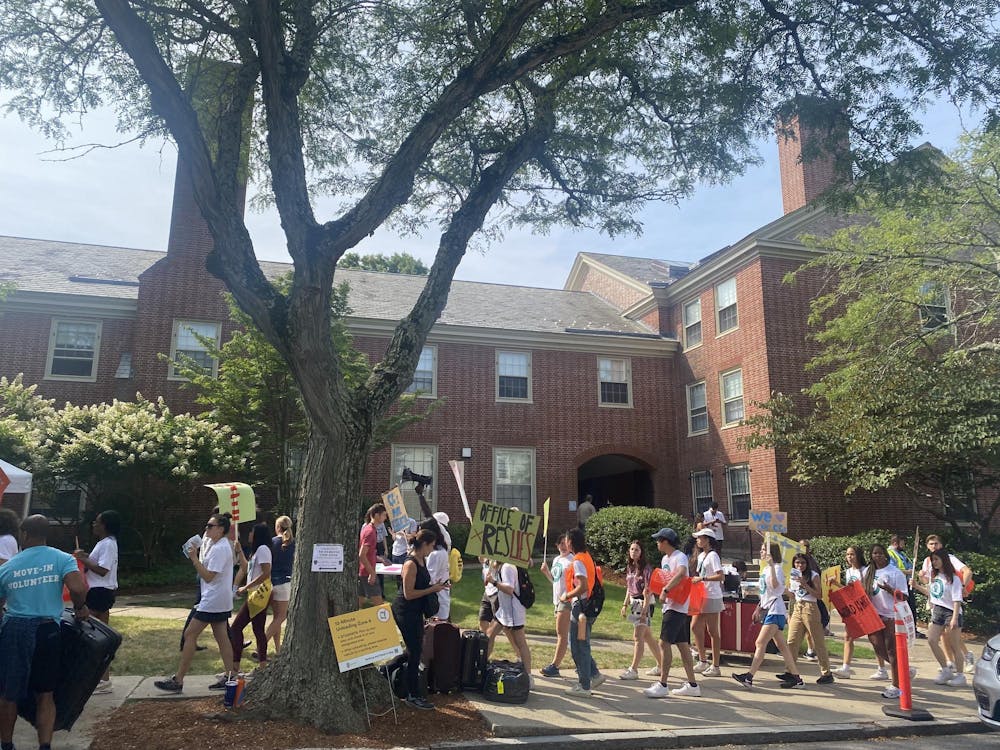The Labor Organization of Community Coordinators voted on Friday afternoon to end its strike over alleged unfair labor practices and deadlocked contract negotiations. The strike started three days ago when hundreds of first-year students moved into campus.
The union announced the end of the strike in an Instagram post Friday evening. Community Coordinators will return to work Saturday morning, according to union organizer Anna Ryu ‘25.
“Community Coordinators play an important role in supporting residential life at Brown, and we’re excited for them to resume normal duties on Saturday,” University Spokesperson Brian Clark wrote in an email to The Herald.
Union members voted “overwhelmingly” to end the strike at a general membership meeting held on Friday afternoon, Ryu said, citing progress in informal talks between union leaders and administrators.
“We’ve moved much closer together on a number of our bargaining issues, especially with responsibilities, training, and rehire and reappointment process,” Ryu said. An agreement on compensation has yet to be reached, she said.
“We had productive conversations in recent days,” Clark wrote. “We’ll continue good-faith efforts toward LOCC’s first contract with Brown, and we’re optimistic about additional progress as bargaining proceeds in the days to come.”
Dozens of LOCC members attended an open bargaining session with administrators on Thursday, according to union organizer Daniel Newgarden ʼ25, who said that the session did not lead to new progress but demonstrated the union’s staying power.
“It sort of provided a reset on the bargaining process,” Newgarden said. “Following that, we feel like we established enough trust with them and that they will respect us going forward.”
Soon after the bargaining session, union leaders began informal sidebar discussions with University administrators. The “clarity” administrators provided on issues like programming budgets, as well as the perceived potential for movement on key contract demands, generated renewed optimism that the union could make progress in future bargaining sessions, according to Ryu.
“We got to a point where we felt like we were in a good position to bargain further in good faith,” Newgarden said. “We weren’t just going to stay on strike for the purpose of dragging it on further.”
Despite emerging from the strike with a clearer path forward on job expectations, training responsibilities and the rehiring process, Newgarden acknowledged that LOCC is unlikely to secure the $17,444 stipend it has demanded throughout negotiations. The University previously countered with an interim proposal that included a $12,000 stipend, 15% more than the $10,500 that CCs currently receive.
“It’s been acknowledged by all parties that we won’t get to the $17,000 this year, just given the University’s budgeting process and the fact that ResLife’s budget for the year has been set,” he said.
The organizer noted that the informal talks after Thursday’s bargaining session helped establish a framework of “trust in our partners” that, combined with the union’s show of strength during the strike, give it a path towards its ultimate compensation goal.
The next bargaining session between community coordinators and the university will take place on Sept. 4 at 6 p.m.

Ethan Schenker is a university news editor covering staff and student labor. He is from Bethesda, MD, and plans to study International and Public Affairs and Economics. In his free time, he enjoys playing piano and clicking on New York Times notifications.





